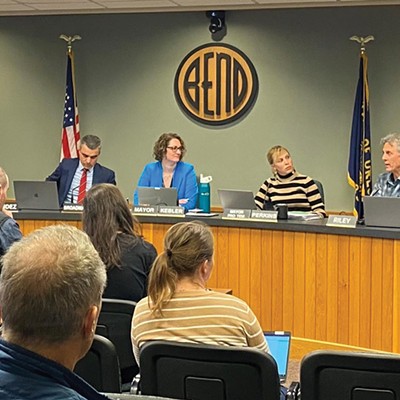Ah, the gentle sound of commerce.
It's 3 am and your windows are open. There it is again—that familiar sound of a freight train, blasting its horn as it passes through Bend. You roll over, toss a pillow over your head and try to ignore the "gentle" sounds of commerce.
It's 7 am and you've had a long night. But right on schedule, a construction crew arrives next door, ready to pave your street or build a new apartment complex, complete with the requisite sounds of hammering or drilling or machine-operating. "It's the sound of commerce," you tell yourself as you make your morning coffee.
Sounds such as those can exceed the decibel levels allowed by the City of Bend's noise ordinance, last updated in 2012. "But they're the sounds of commerce," we say—and that's why we can, and should, accept them.
Know what else is a sound of commerce? The sound of music floating from the Century Center's outdoor concerts, perhaps a handful of times each year. Music, while the particular brand might not fall into your general aural acceptance group, is a form of commerce, and one that continues to keep Bend humming. Before the Century Center was a center of commerce and a sometimes-music venue, it was a wood products processing center—one that neighbors report made a lot of noise. Did neighbors resort to complaining to the City of Bend, to the point of forcing the City to engage a mediator when it was wood products and not music that helped keep Bend's economic engine running?
While it's true that some sounds are the byproducts of commerce (trains), while others are the actual arbiters of commerce (music shows), they are both contributing to Bend's thriving economy. People visit—and live in—Bend in part because of the many social and cultural events that happen here. Music can and should be viewed as any other industry that benefits the local economy.
Gentrification is a double-edged sword, not always beneficial to longtime homeowners in neighborhoods such as River West. It drives up property values—sometimes exceedingly—adding further property tax burden onto residents whose homes were once adjacent to less-desirable wood products businesses, yet now sit near music venues, breweries and boutique exercise studios. While we acknowledge that gentrification isn't always pretty to the people who have remained, we also ask, what would it look like to have those new businesses shut down? If the all-too-recent Great Recession is an indicator, that scenario was worse than gentrification, in the loss of property values, tax revenues and general blight.
So which scenario does the majority really desire?
Most venue owners aim to be good neighbors. The Century Center, as we reported in our Aug. 31 feature story, ends its shows by 10 pm. Those few shows have rarely exceeded decibel limits. Its organizers have come to the table time and again to try to be good neighbors, and even adding noise buffers to curb complaints. The owner of the permanent venue inside the Century Center, Volcanic Theatre Pub, has added insulation and additional cooling mechanisms to help comply with neighbors' requests to control noise levels. GoodLife Brewing has chosen not to include amplified drums at its shows.
We believe the relatively few neighbors who have made this their key issue on the west side of Bend are overdoing it. But if those neighbors wish to control noise, can we start with the 3 am wakeup calls from Burlington Northern Santa Fe?




















